英语人教版八年级下册Unit-3-教案汇编
人教版八年级英语下册Unit3单元教学设计

1.通过情景教学法,创设真实语境,让学生在实际语境中学习并运用一般过去时;
2.运用任务型教学法,设计各种听说读写活动,提高学生的语言综合运用能力;
3.采用小组合作学习,鼓励学生互相交流,分享自己的经历,培养合作精神;
4.利用多媒体教学资源,如图片、视频等,丰富课堂教学内容,提高学生的学习兴趣;
d.课后布置相关作业,让学生运用所学知识进行写作,提高语言运用能力。
2.针对教学难点,采取以下措施:
a.提供典型例句,分析一般过去时的句子结构,帮助学生掌握语法规则;
b.创设丰富的语境,让学生在情境中进行角色扮演,提高口语表达能力;
c.设计分层教学,针对不同水平的学生提供不同难度的练习,使每个学生都能在原有基础上得到提高;
5.通过学习英语,拓宽视野,增强对世界的认知,树立正确的人生观和价值观。
二、学情分析
八年级下册的学生已经具备了一定的英语基础,对一般现在时和一般将来时有了较好的掌握。在此基础上,本单元的一般过去时对于学生来说是一个新的挑战。学生在学习过程中可能存在以下情况:
1.对一般过去时的理解和运用尚不熟练,需要通过具体实例和反复练习来巩固;
2.学会使用一般过去时描述过去发生的事情,如:I visited my grandparents last week;
3.能够听懂并参与课堂讨论,分享自己的过去经历;
4.提高阅读理解能力,理解并掌握课文中的重点句型和语法结构;
5.提高写作能力,能够运用一般过去时写作文,描述过去发生的事情。
(二)过程与方法
4.教师带领学生进行句型替换练习,巩固一般过去时的用法。
(三)学生小组讨论
1.教师将学生分成小组,要求他们用一般过去时描述过去发生的事情,如:“What did you do last weekend?”
(完整版)英语人教版八年级下册Unit3教学设计

(完整版)英语人教版八年级下册Unit3教学设计课题:Unit 3 Could you please clean your room?Period 1 (Section A 1a-1c)学习目标【Learning objectives】1.掌握单词: rubbish, fold, sweep, floor, take out the rubbish.2.学会礼貌地提出请求并熟练练习对话。
重点和难点【Important and difficult points】教学重点:能熟练拼读单词及短语rubbish, fold, sweep, floor, take out the rubbish.教学难点:学会用句型“Could you please…”来礼貌地提出请求。
预习内容【prepare lessons before class】1.要求学生掌握单词rubbish, fold, sweep, floor, take out the rubbish并指导学生找出家务活的表达方式。
2. 指导学生用“Could you please…”造句。
学习过程【Learning process】一、预习反馈,明确目标【Preview feedback, Clear objective】1.本节课的单词你有更多的是积累吗?2.写出更多家务琐事的表达方式:3.你知道怎样礼貌地提出请求吗?二、创设情境,自主探究【Create situations, Self inquiry】1. T: 1) Do you help to do any chores at home ?2) What work do you usually do to help your parents?3) Which one are you good at?Ss: Discuss the teacher’s questions with their partners.2. Check(√) the chores you can do in 1a and add more chores.三、展示交流,点拨提升【Display communication, Coaching to enhance】1. T: 1. Who are the two people in the picture? Why do yousay so?2. Where are they? How do you know?2. Read the chores and add more chores.3. Use “Could you please…” to make a conversation just like Peter and his mother. 1c.4. Listen to 1b and check their answers.四、师生互动,拓展延伸【Teacher-student interaction, Development】【归纳】Make polite requests. ------ Could you please…? Yes, sure./ OK, but……【拓展】1.Can you do some dishes?2. rubbish的同义词:eg. You do talk rubbish sometimes. 胡言乱语【辨析】1. do 与make2. clean 与sweepeg. Let’s clean the house. You sweep the floor and I wash the dishes.五、达标测评, 巩固提高【Evaluation standards,Consolidation and improvement】基础题I. 根据句意及首字母提示写出单词。
人教版英语八年级下册Unit3SectoinA(3a3c)教学设计

4.口语表达:创设真实的语言环境,让学生运用所学知识进行口语表达。教师可以组织角色扮演、小组讨论等活动,引导学生在实际情境中运用一般现在时和频率副词。
5.语法讲解:结合课本内容,用生动的例子和形象的比喻,讲解一般现在时的用法和频率副词的位置。通过对比、练习等方法,让学生掌握语法知识。
3.观看一段关于运动或业余爱好的英文视频,总结视频中的主要内容和关键信息。
作业要求:以书面形式提交观后感,不少于100词,涉及视频中出现的运动项目、活动场景以及个人感受。
4.结合课本3a和3c的内容,完成课后练习题,巩固一般现在时的用法和频率副词的位置。
作业要求:认真完成练习题,对于错误的地方进行修改和反思,确保掌握相关知识。
二、学情分析
八年级下册的学生已经具备了一定的英语基础,他们已经熟悉并掌握了一些基本的语法结构和词汇,能够进行简单的英语对话和阅读。在此基础上,他们对运动和业余爱好这一话题有着较高的兴趣和热情,这为本节课的教学提供了良好的基础。然而,学生在实际运用英语进行表达时,仍存在一些困难,如一般现在时的正确使用、频率副词的位置把握等。此外,学生的听说能力发展不均衡,部分学生口语表达较为流利,而部分学生则在听力理解上存在一定难度。因此,在教学过程中,教师应充分考虑到这些学情特点,采取分层教学、个别辅导等方法,帮助每个学生克服困难,提高英语综合运用能力。同时,注重激发学生的学习兴趣,营造轻松愉快的课堂氛围,让他们在愉悦的情感中学习英语,提升学习效果。
人教版英语八年级下册Unit3SectoinA(3a3c)教学设计
一、教学目标
(一)知识与技能
及分析人教版英语八年级下册Unit3大单元教学设计

-定期组织展示活动,让学生在实践中展示自己的学习成果,增强自信心。
4.教学延伸:
-鼓励学生参与学校或社区的实际志愿者活动,将所学知识运用到实践中。
-建立学习小组,利用课后时间进行英语角活动,提高学生的语言实际运用能力。
-结合单元主题,开展跨学科活动,如社会调查、研究报告等,拓宽学生的学习视野。
4.口语作业:与家人或朋友进行一次关于志愿者工作的英语对话,尝试使用本节课学到的词汇和时态,记录下对话内容。
5.研究任务:选择一个感兴趣的志愿者组织或活动,通过网络或图书馆资源,了解该组织或活动的基本信息、活动宗旨和参与方式,下节课向同学分享。
作业布置注意事项:
-确保作业难度适中,既能巩固课堂所学,又不会给学生造成过重的负担。
四、教学内容与过程
(一)导入新课
在这一阶段,教师将运用多媒体资源,以生动有趣的方式导入新课。首先,在大屏幕上展示一组志愿者活动的图片,如环保清洁、帮助老人过马路等,让学生们观察并思考这些图片中的共同点。随后,提出问题:“What are they doing? Why do they do these things?”引导学生展开思考。
(二)过程与方法
在本章节的教学过程中,教师将采用以下方法帮助学生达成学习目标:
1.采用任务型教学法,引导学生通过完成具体的任务,如小组讨论、角色扮演等,提高英语实际运用能力。
2.利用多媒体教学资源,如图片、视频等,激发学生的学习兴趣,增强课堂的趣味性。
3.通过小组合作学习,培养学生的团队协作能力和沟通能力。
-通过真实语境的创设,让学生在实践中感受时态的用法,提高口语表达能力。
-引导学生通过预读、细读和总结等步骤,提高阅读理解能力。
人教版八年级英语下册Unit3Couldyoupleasecleanyourroom全单元教案
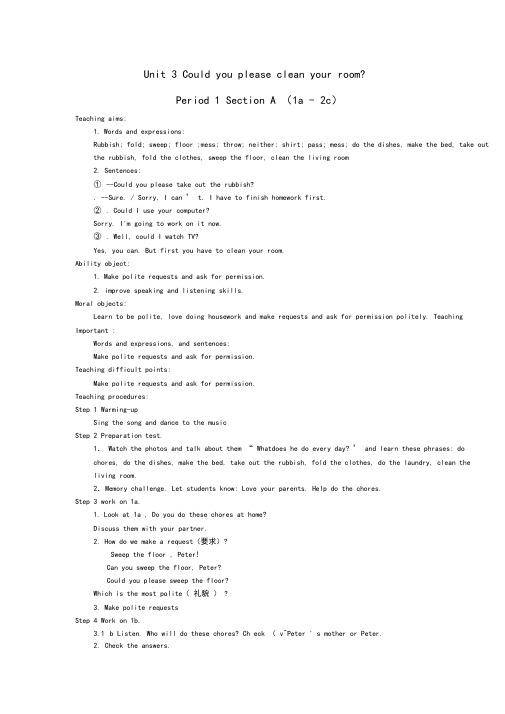
Unit 3 Could you please clean your room?Period 1 Section A (1a - 2c)Teaching aims:1.Words and expressions:Rubbish; fold; sweep; floor ;mess; throw; neither; shirt; pass; mess; do the dishes, make the bed, take out the rubbish, fold the clothes, sweep the floor, clean the living room2.Sentences:①--Could you please take out the rubbish?. --Sure. / Sorry, I can ’ t. I have to finish homework first.②. Could I use your computer?Sorry. I'm going to work on it now.③. Well, could I watch TV?Yes, you can. But first you have to clean your room.Ability object:1.Make polite requests and ask for permission.2.improve speaking and listening skills.Moral objects:Learn to be polite, love doing housework and make requests and ask for permission politely. Teaching Important :Words and expressions, and sentences:Make polite requests and ask for permission.Teaching difficult points:Make polite requests and ask for permission.Teaching procedures:Step 1 Warming-upSing the song and dance to the musicStep 2 Preparation test.1.Watch the photos and talk about them “ Whatdoes he do every day? ’ and learn these phrases: dochores, do the dishes, make the bed, take out the rubbish, fold the clothes, do the laundry, clean the living room.2.M emory challenge. Let students know: Love your parents. Help do the chores.Step 3 work on 1a.1.Look at 1a , Do you do these chores at home?Discuss them with your partner.2.How do we make a request(要求)?Sweep the floor , Peter!Can you sweep the floor, Peter?Could you please sweep the floor?Which is the most polite(礼貌) ?3.Make polite requestsStep 4 Work on 1b.3.1 b Listen. Who will do these chores? Ch eck ( v^Peter ' s mother or Peter.2. Check the answers.Step 5 Group work .Group work: Family drama( 家庭短剧)1.Each group is a family.2.We need to clean the house.3.To make a similar conversation of listening material.Example:Mom : We need to clean the house. We are going to have a party.Dad : Could you please sweep the floor?Peter: No problem.Grandpa: Well, could you please do them? I ’ m going to clean the living room.Step 6 Listening 2a&2b1.Peter asks his father if he can do four thing s. What does his father say? Check ( V) yes ” or“ no” . Listen again. Draw lines to the reasons.2.Check the answers .Step 6 Pair work.Make conversations using the information in 2a and 2bA:Could I use your computer?B:Sorry. I ’ m going to work on it now.A: Well, could I watch TV?C:Yes, you can. But first you have to clean your room?Period 2 Section A (2d , grammar )Teaching aims:1.Words :Mess; borrow, invite, disagree, snack, teenager2.Sentences:Yes, because Mom will be back from shopping any minute now. And she won she sees this mess.t be happy if But the house is already pretty clean and tidy!Could you buy some drinks and snacks?Could I invite my friends to a party?Could I go out for dinner with my friends?OK/ Sure, that should be OK.No, you can ’ t. You have a basketball game tomorrow.Ability object:1.Make polite requests and ask for permission.2.improve speaking and reading skills.3.Master the structures of could .Moral objects:Learn to be polite, love doing housework and make requests and ask for permission politely.Teaching Important :Words and expressions, and sentences:Make polite requests and ask for permission.Teaching difficult points:Make polite requests and ask for permission.Teaching procedures:Step 1 Warming-up .1.Watch a video and answer:Who is the girl in the movie?Is the house clean or dirty?What did she do?2.Do some exercises.Step 2 Work on 2d.1.2d Read the conversation and answer:What chores will Tony have to do?2.2d Role - play the conversation.Step 3 Presentation.1.Read ,think the knowledge.2.Give some explainationsStep 4 Work on 4a.1.Write R for requests and P for permissions. Then match each one with the correct response.2.Check the answers.Step 5 Work on 4b.1.4b Fill in the blanks in the conversation.2.check the answers.Step 6 Work on 4c.4c Make a list of things your group needs to do for a camping trip. Then discuss who will do bring a tent them and complete the chart.Example:A:Could you please bring Liu Chang?B:Sure. And could you please •••?C:Sorry, I can ' t. I have to …Step 7 Homework.Period 3 Section A (3a-3c )Teaching aims:1.Words and expressions:throw, neither, shirt, all the time, as soon as.2.Sentences:①. He wanted a walk, but I was too tired. I threw down my bag and I went to the living room.②. “ No! ” she replied angrily. h TV“ayllothuewtaimtce and never help out around thehouse!I can ’ t work all day and do housework all evening. ”③. “ well, I work all day at school, too! I ’ m just as tired as yaocuka. re! ” I shouted b Ability object:1.Make polite requests and ask for permission.2.improve speaking and reading skills.Moral objects:Learn to be polite, love doing housework and make requests and ask for permission politely.Teaching Important :Words and expressions, and sentences:Make polite requests and ask for permission.Teaching difficult points:Make polite requests and ask for permission.Teaching procedures:Step 1 Warming-upStep 1 Lead in.1.T: We have leaned the phrases about chores. Look at the picture, what are they doing?Do you often do chores at home ?Show the title.Step 2 2b Reading.2.Look at the picture and answer :Does Nancy often do any housework?3.Read the passage carefully and answer.How does Nancy ’ s and her mother’ s feelings change?4.Read the sentences.5.Read the passage and answer the following questions.①Why was Nancy ' s mom angry with Nancy?② Did they solve the problem? How?③ Can you infer what Nancy ’ s mother will feel ?6.What do you learn from the message?We need to share the housework to have a clean and comfortable home .Can you infer what Nancy will do at home?Step 3 Work on 3b.Read the story again and read the sentences below. Underline the sentences from the readingthat mean the same thing.1.Neither of us did any housework for a week.2.My mom came over as soon as I sat down in front of the TV.3.You ’ re tired, but I ’ m tired, too.Step 4 Work on 3c.. Decide whether the underlined words in the sentences are verbs or nouns. Then write another sentence using the underlined word in the other form.1.Could you take the dog for a walk? (noun)2.Could I watch one show first?3.I can ’ t work all day.4.You watch TV all the time.5.“ What happened? ” she asked in surprise.Step 5 Homework.Period 4 Section B (1a-1e )Teaching aims:New words: snack teenager borrow invitePhrases: buy some drinks and snacks; borrow some money; invite sb. to a party/to do sth. Sentences :--Could you please clean your room?--Yes, sure. / Sorry, I can ' t. I have to do my homework.-- Could I invite my friends to aparty?--Of course/ Yes, you can /No, you can Ability object: t. You have to1.Make polite requests and ask for permission.2.improve speaking and listening skills.Moral objects:Learn to be polite, make requests and ask for permission politely; and love parents. Teaching Important :Words and expressions, and sentences:Make polite requests and ask for permission.Teaching difficult points:Make polite requests and ask for permission.Teaching procedures:Step 1 lead-in.1. Show the title.2. DiscussionQ: Do you help your parents do the chores at home?Q: Do your parents ask you to do a lot of things forthem?What do your parents ask you to do?What do you ask your parents Step 2 Work on 1a.1.What do teenagers ask their parents 'permission for?' permission for? What do parents ask their teenagers todo? Write parents or teenagers next to each phrase.2. Check the answers.Step 3 Finish 1b.Use the phrases in 1a to makeconversations.Example :Parents : Could you clean your room ?Child : Yes, I can.Child : Could I invite my friend to aparty ?Parents : No, you can't .Useful language:1.Parents: Could you please …?Child: Yes, sure. / Sorry, I can ' 2.Child: Could I •••? t. I have to ...Parents: Yes, you can. / No, you can t.You ...Step 4 Finish 1c and 1d.1.Listen to a conversation between Sandy and her mom. Check ( V ) Oh wdhings in 1a thhear.2.Listen again. Fill in the chart.Step 5 Finish 1e.You are having a party. Invite your partner to come your party and ask for help withthese things. So, talk about the following things with your partner.e.g. A: Would like to come to my birthday party?B: Yes, I ' d love to./Sorry, I can ' t. I have to …A:Could you please take out the rubbish?B:Yes, sure./No, I can ' t. I have to do …Step 6 Homework.Period 5 Section B (2a-2e)Teaching aims:1.Learn and review some important phrases and target languages.2.Review how to make polite requests how to ask permissions politely3.Read the letters carefully and surf the Internet, try to find out more reasons to supportyour idea, and then write a letter to th e person that you don ’ t agree with.Ability object:1.Learn how to debate and show your own opinions.2.Practice speaking, reading and writing skills.3.Interview your friends, your teachers or your parents about their opinions about kids doingchores and take notes.Moral objects:Discuss with your partners and show your own opinions.Teaching Important :Learn and review some important phrases and target languages.Teaching difficult points:1.Interview your friends, your teachers or your parents about their opinions about kids doingchores and take notes.2.Read the letters carefully and surf the Internet, try to find out more reasons to supportyour idea, and then write a letter to the person that you don ’ t agree with.Teaching procedures:Step 1 Warming-up1.Review.Step 2. 2a. pre-reading.2.Discuss the questions with your partner① What do you often do to help your parents at home?② Do you think kids should help out with chores at home?3.New words learning.Step 3. While reading1.What ’s “ Skimming “2.2b. The Sunday Mail magazine invited parents to write about whether they think young peopleshould do chores at home. Skim the following letters. Which one agrees and which onedisagrees?3.Reading.①. Read the examples, and guess the meanings of “ pro” and “ con” .②2c. According to Mr. Smith and Ms. Miller, what are the pros and cons about kids doingchoresStep 4 Post reading.1.Be a good debater. Let ’s have a debate.2.2d. Write one sentence with each phrase from the letters.3.2e Discuss the questions with a partner.Step 5 Homework.Period 6 Section B (3a-self check )Teaching aims:1. WordsFair; unfairnguage:help with housework and chores at home have enough stress from schoolspend the time on school work in order toThere is no need for them to …It is important for sb. to do sth.It ' s not enough to … develop children ' s independence The more •••, the more …Ability object:1.Learn how to show your own opinions.2.Practice speaking, and writing skills.Moral objects:Discuss with your partners and show your own opinions. Teaching Important :1.Learn how to show your own opinions.2.Practice speaking, and writing skills.Teaching difficult points:1.Learn how to show your own opinions.2.Practice speaking, and writing skills.Teaching procedures:Step 1 Warming-upSection B 2 (3a —Self check)Step 1 RevisionDiscuss the questions with a partner. And take notes.Do you think children should do some chores at home? Why or why not?1.信头:发信人地址和日期。
新人教版八年级英语下册unit3教案教学文案

新人教版八年级英语下册Unit3 Could you please clean your room ?Section A (1a—2c)教案Teaching Aims :1.Knowledge Objects :(1).Master the key words and phrases:rubbish, take out the rubbish, fold, sweep, floor, mess.(2).Target language :—Could you please ...?—Yes, sure. /All right. /No problem./Certainly/Of course.Sorry, I can't. I have to do...Sorry, I can't. I am doing...—Could I ...?—Yes, you can. /Sorry, you can’t.2.Ability Objects :(1).Learn to make a polite request and ask for permissions.(2).Be able to understand the dialouges about making a polite request and asking for permissions.3.Moral Objects :(1).Lead the students to know that it’s always right to be polite.(2).Chores are part of fun in our life.Teaching Key Points :1.Master the new words and expressions.2.How to make a polite request and ask for permissions.Teaching Difficult Points :Be able to make polite requests and ask for permissions.Teaching Aids :A tape recorder, A projector.Teaching Procedures :Step 1 Lead-inGreet the class ang listen a song“我爱我家”.(Show some pictures about home in the projector.)Ask some questions:Eg: Do you like your family ? Do you like your father ? Do you like your mother ? Who is the busiest at your home? Why is your house clean?Step 2 Presentation1.Introduction and new words learning.T: Your mothers are always busy, beacuse there are many chores at home. (Learn chore.) For example : do the dishes, take out the rubbish, fold the clothes, sweep the floor, make the bed, clean the living room.Next teach the new words and phrases by using the pictures in the projector.Then ask students “ what other chores do you know?”2.Guessing game. What is she doing ?3.Pair work. Do you do these things at home? Write “Y”for “yes”and “N”for “no”.4.The key sentence introduction.T: If you want Peter to do the dishes, what should you say ? “Peter, do the dishes.”“Can you do the dishes ?”“Could you please do the dishes ?” Which sentence is the most polite ?Ss :Could you please do the dishes ?T: Here, could is not the past tense. Using could is more polite.—Could you please ...?Yes, sure. /All right. /No problem./Certainly/Of course.Sorry, I can't. I have to do...Sorry, I can't. I am doing...Step 3 Teaching activitiesActivity 1 Group work.Welcome to my room ! But this is a dirty room. How to make the room clean? Division of labor within the group.The fastest group is the winner. The key sentence:—Could you please ...?Yes, sure. /All right. /No problem./Certainly/Of course.Sorry, I can't. I have to do...Sorry, I can't. I am doing...Activity 2 Listening.1.Review the chores. Then listen to the tape, who will do these chores?Check (√)Peter’s mother or Peter.2.Listen again, finish the blanks.3.Role play the tapescript. The boys PK the girls.Activity 3 Interview .Who is the most able at home?1. What chores do you do at home? How often do you do the chores? Work in group.2. Then one student make a report to the class. “In my group,…. does the dishes every day,…We think …is the most able one in our group.”3.The awards.Give the awards to the most able student in each group.Step 4 Summary1. New vocabularydo the dishes, sweep the floor, take out the trash, make the bed, fold the clothes, clean the room2. —Could you please ...?—Yes, sure. /All right. /No problem./Certainly/Of course.Sorry, I can't. I have to do...Sorry, I can't. I am doing....Step5 Homework1.Conversation practice:Make a conversation between you and your parent about doing the chores. Remember to use the sentences we learnt today.2.Review and remember the new words.【Blackboard Design】Unit 3 Could you please clean your room?Section A 1a—1cLove our parents! Help do the chores!。
最新人教版八年级下册英语精品教案设计Unit 3
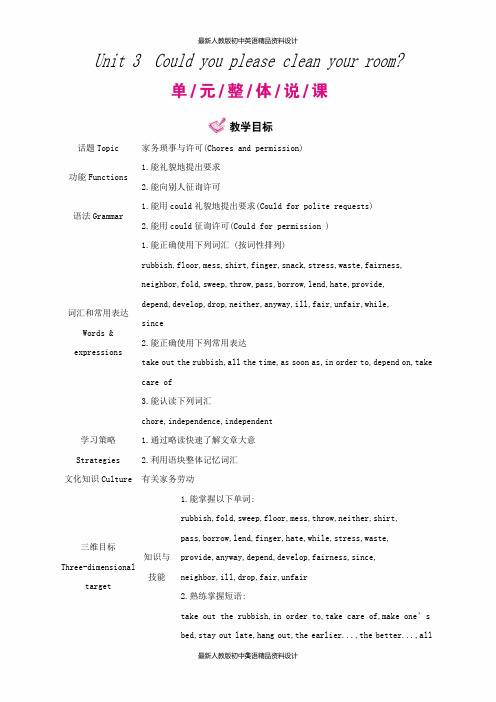
Unit 3 Could you please clean your room?话题Topic 家务琐事与许可(Chores and permission)功能Functions1.能礼貌地提出要求2.能向别人征询许可语法Grammar1.能用could礼貌地提出要求(Could for polite requests)2.能用could征询许可(Could for permission )词汇和常用表达Words & expressions 1.能正确使用下列词汇 (按词性排列)rubbish,floor,mess,shirt,finger,snack,stress,waste,fairness, neighbor,fold,sweep,throw,pass,borrow,lend,hate,provide,depend,develop,drop,neither,anyway,ill,fair,unfair,while,since2.能正确使用下列常用表达take out the rubbish,all the time,as soon as,in order to,depend on,take care of3.能认读下列词汇chore,independence,independent学习策略Strategies 1.通过略读快速了解文章大意2.利用语块整体记忆词汇文化知识Culture 有关家务劳动三维目标Three-dimensionaltarget 知识与技能1.能掌握以下单词:rubbish,fold,sweep,floor,mess,throw,neither,shirt,pass,borrow,lend,finger,hate,while,stress,waste,provide,anyway,depend,develop,fairness,since,neighbor,ill,drop,fair,unfair2.熟练掌握短语:take out the rubbish,in order to,take care of,make one’sbed,stay out late,hang out,the earlier...,thebetter...,allthe time,depend on,as soon as,do the dishes,get a ride,comeover,be angry with,in surprise3.能掌握以下句型:Could you please do sth.?I have to do some work.Could I do sth.?She won’t be happy if she sees this mess.For one week,she did not do any housework and neither did I.My mom came over as soon as I sat down in front of the TV.主语+hate+(to do/doing) sth.4.学会用could 礼貌地请求和征求许可。
英语人教版八年级下册Unit 3 教学设计
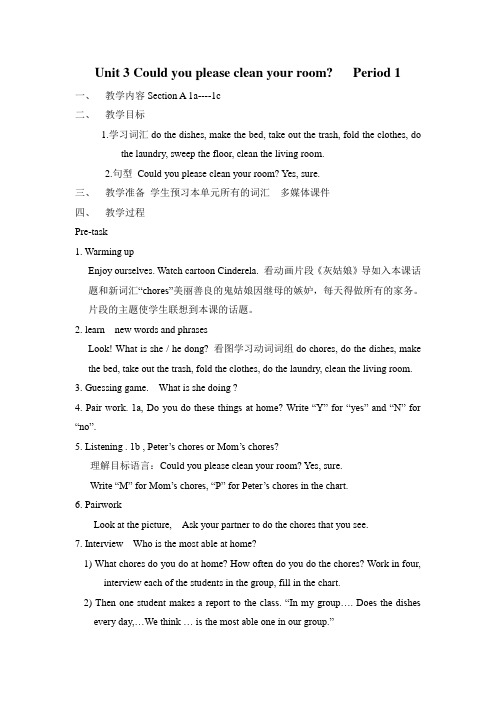
Unit 3 Could you please clean your room? Period 1一、教学内容Section A 1a----1c二、教学目标1.学习词汇do the dishes, make the bed, take out the trash, fold the clothes, dothe laundry, sweep the floor, clean the living room.2.句型Could you please clean your room? Yes, sure.三、教学准备学生预习本单元所有的词汇多媒体课件四、教学过程Pre-task1. Warming upEnjoy ourselves. Watch cartoon Cinderela. 看动画片段《灰姑娘》导如入本课话题和新词汇“chores”美丽善良的鬼姑娘因继母的嫉妒,每天得做所有的家务。
片段的主题使学生联想到本课的话题。
2. learn new words and phrasesLook! What is she / he dong? 看图学习动词词组do chores, do the dishes, make the bed, take out the trash, fold the clothes, do the laundry, clean the living room.3. Guessing game. What is she doing ?4. Pair work. 1a, Do you do these things at home? Write “Y” for “yes” and “N” for “no”.5. Listening . 1b , Peter’s chores or Mom’s chores?理解目标语言:Could you please clean your room? Yes, sure.Write “M” for Mom’s chores, “P” for Peter’s chores in the chart.6. PairworkLook at the picture, Ask your partner to do the chores that you see.7. Interview Who is the most able at home?1) What chores do you do at home? How often do you do the chores? Work in four,interview each of the students in the group, fill in the chart.2) Then one student makes a report to the class. “In my group…. Does the dishesevery day,…We think … is the most able one in our group.”8. 总结本节课的教学重点。
人教版PEP八年级下册英语教案Unit-3-第精选全文完整版

可编辑修改精选全文完整版第三课时Section A(Grammar Focus~4c)【学习目标】1.学生能学会本课时出现的生词及短语:pass,borrow,lend,finger,hate,chore,while,pass sb.sth.,lend sb.sth.,get it wet,hate to do sth.,borrow sth.from sb.2.教会学生熟练运用句型Could you please…?【学习重点】掌握句型Could you please…?与Could I…?以及单词borrow,lend 和hate的用法。
【学习难点】总结归纳提出请求,或请求允许的方法。
情景导入师生自由创设情境,扮演家庭成员,询问交流引入话题。
T:Could you please pass me the salt?S:Sure.Here you are.自学互研Task 1【组内小展示】先由各小组组长带领组内成员认读单词和词组,再在整个小组内进行齐读后对词汇的用法进行归纳,并标记出发音和理解困难的单词,可及时向老师求助。
最后,板书展示内容。
【班级大展示】1.I can read.(我会读)①带读——齐读,注意finger的发音;②通过游戏形式,如单词游戏来巩固单词的学习。
2.I can write.(我会写)①以answer quickly(抢答)的方式对词组进行中英互译;②带读——齐读;③抽测:可以用造句的方式巩固词组的用法。
3.I can practice.(我会练)①结合所学的could的用法,完成句子;②通过练习总结“Could you please…?”和“Could I please…?”的用法。
情景导入生成问题1.(T)Question:Could you please pass me that book?(S)Answer:________________________________________________________________________ 2.(T)Question:Could we finish reading this book together?(S)Answer:________________________________________________________________________自学互研生成能力Task 1Let's read the new words and phrases.1.I can read.(我会读)pass,borrow,lend,finger,hate,while,chore2.I can write.(我会写)(1)pass me the salt 递给我盐(2)come back too late 回来太晚(3)hate to do sth.讨厌做某事(4)finish reading 读完(5)hang out with my friends 与朋友闲逛(6)try(not)to do sth.尽量(不)做某事(7)get it wet 让它打湿(8)lend me some money借给我一些钱3.I can practice.(我会练)根据汉语意思完成下列句子,每空一词。
八年级英语下册(人教版)Unit3单元整体教学设计

学生分组进行角色扮演,模拟旅游场景,录制一段对话视频。要求对话内容涉及以下方面:
-询问和回答关于旅游景点的问题;
-描述景点的历史、文化及特色;
-推荐旅游路线和活动。
3.阅读作业:
阅读一篇关于旅游的英文文章,完成文章后的阅读理解练习。要求学生在阅读过程中,关注文章中的关键信息,提高阅读理解能力。
4.通过学习本单元,使学生认识到旅游不仅是休闲娱乐,还是了解世界、增长知识、陶冶情操的途径。
在教学过程中,教师要关注学生的学习需求,尊重学生的个性差异,创设有趣、有挑战性的教学活动,激发学生的学习兴趣和积极性。同时,注重培养学生的语言运用能力、思维品质、文化意识和学习能力,使学生在学习英语的过程中,实现全面发展。以下是对本单元的整体教学设计:
(2)运用一般现在时和一般过去时描述城市或景点的特点、历史、文化等。
(3)提高学生的听说能力,使其能在实际场景中运用所学知识进行交流。
2.难点:
(1)正确运用一般过去时描述景点的历史、文化等。
(2)在实际场景中,运用所学词汇和句型进行流畅的表达。
(3)提高学生的信息获取能力,能够从地图、旅游手册等非文字材料中获取关键信息。
(四)课堂练习,500字
1.听力练习:教师播放一段关于旅游的听力材料,学生需完成相应的练习题,检测听力理解能力。
2.口语练习:学生进行角色扮演,模拟导游与游客的对话,实际运用所学词汇和句型。
3.阅读理解:学生阅读课文,了解不同城市的特点,完成相应的阅读理解题目。
4.写作训练:要求学生运用所学词汇和句型,编写一篇关于自己家乡或旅游目的地的短文。
8.多元评价,促进全面发展:
采用形成性评价和终结性评价相结合的方式,关注学生的学习过程和结果,给予及时反馈,促进学生听说读写能力的全面发展。
人教版八年级英语下册Unit3教学设计

3.学生在课堂上表现积极,乐于参与各种活动,但部分学生过于依赖教师引导,缺乏自主学习能力,需要在教学中逐步培养。
4.学生在情感态度上,对英语学习兴趣较浓,但在面对困难时,容易产生挫败感,需要教师关注学生的心理变化,适时给予鼓励和支持。
3.句型:学生能够掌握以下句型的用法:What did you do last weekend? I went to the beach. How was your day? It was boring. What did you have for lunch? I had a delicious sandwich等。
3.学会与他人分享快乐,提高团队协作能力。
4.增强自信心,勇于尝试新事物,不断挑战自我。
5.感受英语学习的乐趣,树立学习英语的信心,提高自主学习能力。
二、学情分析
针对人教版八年级英语下册Unit3的教学内容,对学生学情进行分析如下:
1.学生已具备一定的英语基础知识,能够运用简单的英语进行日常交流,但在表达过去事情时,对动词过去式的运用尚不熟练,需要进一步巩固和指导。
四、教学内容与过程
(一)导入新课
1.教师通过展示一组图片,如:孩子们在沙滩玩耍、参观博物馆、野餐等,引导学生观察并询问:“What are they doing?”、“Can you guess what they did last weekend?”,从而引出一般过去时态的概念。
2.邀请学生分享他们上周的有趣经历,让学生尝试用英语描述,为新课的学习营造轻松愉快的氛围。
5.自主学习:
a.利用网络资源,查找一般过去时的相关资料,加深对语法知识点的理解。
Unit3教学设计人教版八年级英语下册

人教版八年级英语下册第三单元同步教学设计Unit 3Could you please clean your room?1.本单元话题以“家庭琐事与许可”展开,情境属于2022新课标“人与自我”主题范畴中的“做人与做事”这一主题群,涉及子主题“劳动实践,劳动品质与工匠精神”和“勤于动手,乐于实践,敢于创新”。
2.单元主题体现《中国学生发展核心素养》中的“社会参与”方面,提升学生的“实践创新”这一素养,立足于“劳动意识”这一基本要点。
3.能听懂有关做家务,与家人相处或者提建议的对话,并能利用情态动词could来礼貌地提出要求或者征询许可。
4.能读懂关于做家务、帮助他人的文章,并在生活中践行乐于助人的品质。
5.能够围绕“帮助他人”这一话题来进行写作,并维持良好的生活习惯。
6.培养学生家庭责任和义务的意识,增强主动做家务的自觉性。
续表【课时建议】本单元建议5课时Section A (1a-2d)(一课时)Section A (3a-3c)(一课时)Section A (Grammar Focus-4c)(一课时)Section B (1a-1e)(一课时)Section B (2a-Self Check)(一课时)词汇短语:主要采用图片及多媒体展示助记法。
基本句子:采用多媒体展示及交际法(利用多媒体展示两人进行交际时的情景)。
语法:通过对话练习让学生学习情态动词could的用法。
第一课时Section A (1a-2d)Step 1情景导入T:Do you often do housework at home?Take out the rubbish,make the bed or sweep the floor?Doing these things is an exercise and a good way of helping parents.And when talking to parents,it's important to be polite.“Could you please…?” and “Could I…?” are useful sentences to make requests and ask for permission politely.S:…设计意图:通过谈话的方式导入本单元重点句型,激发学生学习本单元的兴趣。
人教版八年级英语下册Unit3单元整体教学设计

针对以上学情,教师在教学过程中应关注以下几点:
1.针对不同学生的语言能力,设计难易适度的教学活动,使每个学生都能在原有基础上得到提高。
2.加强对过去时态的讲解和练习,通过情境创设、角色扮演等方式,帮助学生熟练掌握并运用过去时态。
2.口语作业:学生与家长或朋友一起,用一般过去时态进行对话练习,分享彼此的过去经历。家长或朋友可协助记录对话内容,以供课堂上展示和讨论。
3.词汇积累:要求学生整理本单元所学的动词短语和一般过去时态的动词变化,制作成词汇卡片,便于随时复习和巩固。
4.阅读作业:推荐学生阅读一篇关于过去经历的英文文章或故事,并完成相关阅读理解练习。旨在提高学生的阅读能力,同时巩固一般过去时态的用法。
2.学会尊重他人,理解并接纳不同的文化和生活方式。
3.培养乐于助人的品质,关心他人,善于与人沟通交流。
4.通过学习英语,拓宽视野,提高综合素质,为将来的发展奠定基础。
在教学过程中,教师应关注学生的个体差异,因材施教,使每个学生都能在原有基础上得到提高。同时,注重培养学生的综合素质,将知识、技能、情感态度与价值观有机地结合起来,为学生的全面发展奠定基础。
四、教学内容与过程
(一)导入新课
在导入环节,教师将运用以下策略激发学生的学习兴趣和好奇心:
1.利用图片或视频展示不同学生过去周末的活动,如去公园、参观博物馆等,让学生观察并预测图片中人物的行动。
2.通过提问方式引导学生回顾已学过的动词短语,为新课的学习做好语言上的准备。
-例如:“What did you do last weekend?” “Can you remember what we learned about actions in the past?”
英语人教版八年级下册Unit3教案

Unit3 Could you please clean your room?Period II. Teaching aims and demands:Students learn to make polite requests and ask for permission.II. Teaching key and difficult points:A.Vocabularydo the dishes , sweep the floor, take out the trash, make your bed, fold your clothes, clean the living room, make the bedB.Target languageCould you sweep the floor ? Yes , sure.III. Teaching methods: Audio-lingual methods and PPP IV. Teaching aids: a tape recorderV. Teaching procedureStep 1. Lead inIntroduce mother’s story. Ask students a question: Do you often help your mother with housework?Show a mother’s picture.Step 2. PresentationLearn some new phrases according to the pictures.Task 1 . Point to the items under the heading Chores in thechart .Ask the students what the chores means.(A chore is a job you do at home.)Then point to the items again and read each one to the class .Ask the students to explain the each chore in their own words and say if they do it or not. For example , a student might say, After we eat breakfast the dishes are dirty. We have to do the dishes. Do the dishes is the same as wash the dishes.Task 2. Then read the instructions.Task 3. Ask the students to find a partner.Task 4. Find out which two chores most students do at home.Read and repeat the phrases.Step3.Challenge your memories!Step4. Play a guessing game.Step 5. Understanding the target language in spoken conversation. Task 1. Read the instructions.Task 2. Play the recording the first time. Students only listen. Task 3. Play the recording a second time. And fill in the chart. Then check the answers.Step6. Pair workAsk the students to look at the picture above and ask your partner to do the chores that you see.Step7 Group workMake a survey.Step8.Emotional education .Show a video about mother’s love.Homework1.Make up your own conversations.2. Make six sentences with the target language.。
新人教版八年级英语下册unit3教案
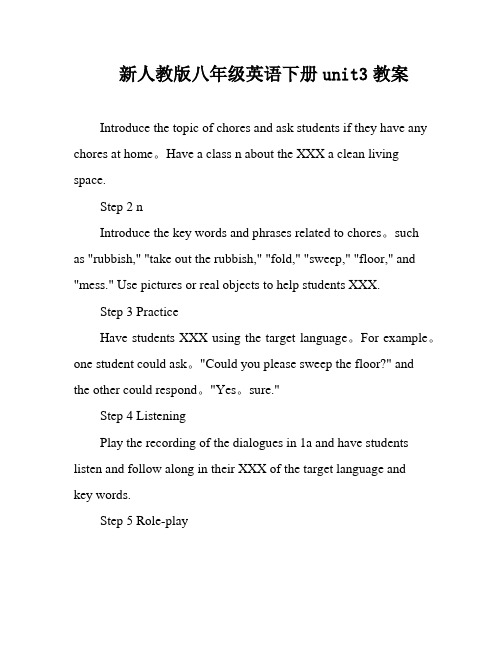
新人教版八年级英语下册unit3教案Introduce the topic of chores and ask students if they have any chores at home。
Have a class n about the XXX a clean living space.Step 2 nIntroduce the key words and phrases related to chores。
suchas "rubbish," "take out the rubbish," "fold," "sweep," "floor," and "mess." Use pictures or real objects to help students XXX.Step 3 PracticeHave students XXX using the target language。
For example。
one student could ask。
"Could you please sweep the floor?" andthe other could respond。
"Yes。
sure."Step 4 ListeningPlay the recording of the dialogues in 1a and have students listen and follow along in their XXX of the target language andkey words.Step 5 Role-playDivide students into groups and have them role-play different s where they make polite requests and ask for XXX them to use the target language and key words they have learned.Step 6 XXXReview the key words and phrases with the class and have them XXX language when making requests and XXX.Step 7 HomeworkAssign XXX the target language and key words。
【精选】人教版八年级下册英语Unit3(第三单元)优秀教案

Unit 3 Could you please clean your room?第一课时Section A (1a2d)【学习目标】1.重点单词:rubbish,fold,sweep,floor,mess2.重点短语:take out the rubbish,fold your clothes,sweep the floor,make your bed,go out for dinner,get a ride3.重点句式:—Could you please sweep the floor?—Yes,sure.—Can I use you computer?—Sorry.I'm going to work on it now.Could you please help out with a few things?Could I at least finish watching this show?I think two hours of TV is enough for you!She won't be happy if she sees this mess.【学习重点】1.重点短语和句型2.熟练运用Could……?提出请求及其回答【学习难点】熟练运用Could……?提出请求及其回答【自主学习】一、预习课本P1718新单词并背诵,完成下面的汉译英。
1.垃圾____________ 2.折叠____________3.打扫____________ 4.地板____________5.杂物____________二、认真预习1a2d找出下列短语和句型。
1.倒垃圾2.叠你的衣服3.扫地4.整理你的床铺5.出去吃饭6.搭车7.—你能扫地吗?—好的,当然可以。
8.—我可以用你的电脑吗?—对不起,我想用它工作。
9.你能帮着做一些事情吗?10.我至少能看完这个节目吗?11.我认为对于你来说两个小时看电视就足够了。
人教版八年级下册英语Unit3(第三单元)优秀教案
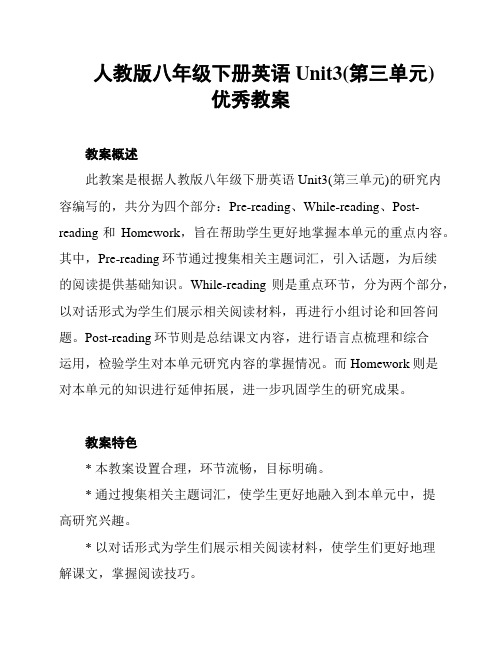
人教版八年级下册英语Unit3(第三单元)优秀教案教案概述此教案是根据人教版八年级下册英语Unit3(第三单元)的研究内容编写的,共分为四个部分:Pre-reading、While-reading、Post-reading和Homework,旨在帮助学生更好地掌握本单元的重点内容。
其中,Pre-reading环节通过搜集相关主题词汇,引入话题,为后续的阅读提供基础知识。
While-reading则是重点环节,分为两个部分,以对话形式为学生们展示相关阅读材料,再进行小组讨论和回答问题。
Post-reading环节则是总结课文内容,进行语言点梳理和综合运用,检验学生对本单元研究内容的掌握情况。
而Homework则是对本单元的知识进行延伸拓展,进一步巩固学生的研究成果。
教案特色* 本教案设置合理,环节流畅,目标明确。
* 通过搜集相关主题词汇,使学生更好地融入到本单元中,提高研究兴趣。
* 以对话形式为学生们展示相关阅读材料,使学生们更好地理解课文,掌握阅读技巧。
* 融入小组讨论和问题回答,激发学生研究积极性和团队合作精神。
* 通过语言点梳理和综合运用,巩固学生对本单元研究内容的掌握情况。
* 设置Homework环节,对本单元的知识进行延伸拓展,进一步巩固学生的研究成果。
教学建议* 教师可以根据本教案的框架,结合自身教学经验和学生的具体情况,进行差异化教学,使教学更具针对性和有效性。
* 教师可以注重激发学生的研究兴趣,设置多样化的教学形式,如PPT、视频等,增强学生对课堂的关注和研究积极性。
* 教师可以加强评价环节,及时反馈学生的表现和问题,并在教学过程中不断进行调整和优化,提高教学效果。
总之,本教案是符合人教版八年级下册英语Unit3(第三单元)学习要求的一份优秀教案,将有力地帮助学生掌握本单元的重点内容,提升学习效果和学习质量。
- 1、下载文档前请自行甄别文档内容的完整性,平台不提供额外的编辑、内容补充、找答案等附加服务。
- 2、"仅部分预览"的文档,不可在线预览部分如存在完整性等问题,可反馈申请退款(可完整预览的文档不适用该条件!)。
- 3、如文档侵犯您的权益,请联系客服反馈,我们会尽快为您处理(人工客服工作时间:9:00-18:30)。
Unit3 Could you please clean your room?SectionA(1a-2d)一、Teaching Analysis教情分析nguage goals 语言目标a、掌握以下短语:take out the rubbish, sweep the floor, make the bed, fold theclothes等。
b、掌握could的基本用法,会用它来表达请求或征求许可及其应答语。
c、掌握以下句型:—Could I / you please..?—Yes, sure. / Sorry, I can’t…2.Ability goals 能力目标教会学生用could礼貌地提出要求和征求许可。
帮助学生积累丰富与做家务相关的话题词汇、语块和句子表达。
通过对话的教学,提升学生听说能力。
3.Emotional goals 情感目标引导学生在社会交往中,学会用礼貌用语。
培养学生热爱劳动,和家人分担家务的能力。
4.Important and difficult teaching points教学重难点1. 教会学生应用could礼貌地提出要求。
2. 教会学生用could礼貌地征求许可。
3 引导学生思考改进优化学习策略。
二、Student analysis学情分析1. Fundamental State基本情况本单元的教学为八年级下期内容,学生通过一年半的时间,已基本适应初中英语学习,具备了一定的英语学习的基本技能,初步掌握了一些学习策略。
本单元的中心话题是谈论家务琐事,学会运用could礼貌地提出要求和征求别人许可,因此,可从学生熟悉的家务事入手,用家务事相关图片进行教学引入,再扩展到运用could礼貌提出要求和征求别人许可,为后面课时逐步引入本单元的教学活动奠定基础,这样不断扩展知识和能力,从而最终实现由不熟悉到熟悉的学习体验过程。
2. Knowledge Reserve知识储备通过一年半的学习和积累,学生积累了一定的词汇量,接触到了常见的话题和功能项目。
学生基本知道如何使用句中含有情态动词的一般疑问句,为本节课谈论话题,以及从听力中捕捉有关信息奠定了知识基础。
3. Class data本班实际本班学生有比较明确的学习目的,能够在小组活动中互相帮助,积极与他人合作,敢于用英语进行表达。
本课时谈论家务琐事,话题内容贴近学生、贴近生活,学生熟悉,有话可说,教师应该尽量创设情景,拓展思路,必要时帮助学生用英语进行准确表达。
4. Teaching methods教法建议4.1 Situational teaching approach情景教学法4.2 Question and answer method问答法4.3 Discussion method 讨论法三、Teaching procedures 教学进程1 . Leading-in and warming-up 引入与激趣活动Free talkT tells Ss about the things she and her son did yesterday and ask a question“Can you guess what we did?” .Ask some Ss about what they usually help their parents do. T Helps them answer the questions in English.2 .New points input 新知输入a、Language presentationT shows some photos and asks a question, “What does he do every day? and teach these phrases about chores: Then T writes the phrases on the Bb:do chores, do the dishes, make the bed, take out the rubbish, fold the clothes, do the laundry, clean the living room.T asks Ss to read the phrases and remember them.Look at these phrases and practice the conversation:—Could you please take out the rubbish?—Sure. / Sorry, I can’t. I have to finish homework first.b、Activity 1ac、Group work. Get Ss to work in groups and discuss the question, “Do you do these chores at home?”. Remember to use the key phrases.d、Invite different Ss to report their discussion in front of class.e、Practice the conversation:Mom: Petter, could you please…?Petter: Yes, sure. /Al l right. /No problem. /Certainly. /Sorry, I can’t. I have to do …2.3 Listening practice 听力训练2.3.1 Activity 1ba、Pre-listening. Get Ss to look at 1b and the blanks on page 1 and ask the Ss to look at the blanks to help them make a prediction before listening. T plays the recording for the first time.b、While-listening. Check the answers:Peter’s mother: do the dishes , sweep the floor, clean the living roomPeter: take out the rubbish, make the bed, fold the clothesc、Post-listening. Make conversations about the chores in 1a.ExamplesA: Could you please...?B: Yes, sure. /All right. /No problem./Certainly./Sorry, I can't. I have to do.../Sorry, I can't. I am doing...In this step, T may want the Ss to practice this key sentence patterns and know how to use them.d、Activity 2a, 2b2a and 2b provide listening practice using the target language.e、Pre-listening. T can tell Ss to read the blanks and predict what the conversation talks about. Then play the recording for the first time.f、While-listening. T can give Ss the opportunities to show their answers.The answers to 2a:Yes: go out for dinner, go to the movies; No: stay out late, get a rideThe answers to 2b:stay out late—You have a basketball game. get a ride—I have to do some work.If Ss give some incorrect answers, T can play the recording again.g、Post-listening. As a post-listening task, T can ask Ss to talk about how to ask for permission.2.4 Oral Output 口语输出Activity 2d is a conversation between a girl and her brother. They talk about doing chores.a、T can encourage Ss to read the conversation alone and find out the answers to the following questions such as,Q1:What does the girl want her brother to do?Q2: Does the girl allow her brother to finish watching the show?Q3: Why does the girl do like that?b、Get Ss to share their answers and check the answers together.c、T can guide Ss to understand the whole conversation. T can play the recording for Ss to listen and repeat. Read the conversation in roles between the girl and her brother.d、Ask Ss to practice several times and ask pairs to come to the front and act out the conversation .2.5 Sentence interpretation 难句理解1. Tony, could you please help out with a few things?Could you take out the rubbish, fold the clothes and do the dishes?结论:“__________________” 后面跟_________。
